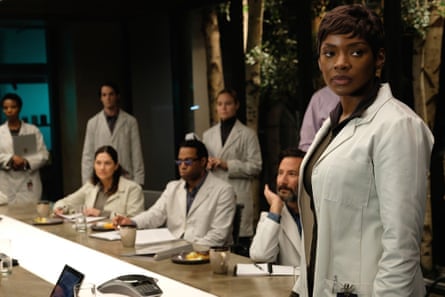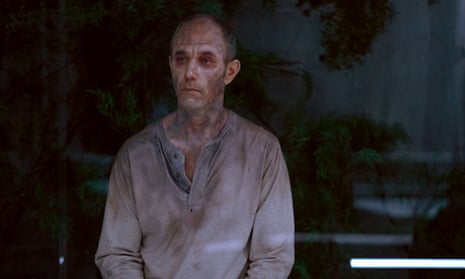How wise dear Blaise Pascal was when he wrote: “All of humanity’s problems stem from man’s inability to sit quietly in a room alone.” If only the good doctors in the opening scenes of this adaptation of Justin Cronin’s bestseller The Passage (Fox) had imbibed his words before they went spelunking for vampires.
That’s your mistake, you see. If you hear rumour of a 250-year-old man surviving in a Bolivian cave, just … leave it. No good can come, y’know?
Best friends Dr Jonas Lear (desirous of a cure for his wife’s early-onset dementia) and Dr Tim Fanning (desirous of the dollars that would come from using an immortal’s blood to develop a vaccine for all known diseases) find their guy. He, alas, is desirous of sinking his teeth into Dr Fanning’s veiny, venal neck and duly does so, turning Fanning (Jamie McShane) into Patient Zero for a vampiric virus that carries the potential to save mankind from all the ills living flesh is heir to. Don’t look too hard at the science. It’s not what we’re here for.
Within a few years, a secret medical facility has acquired a bunkerful of human guinea pigs who, as part of “Project Noah”, have traded life on death row for life as a potentially immortal lab rat (sorry – the Figures of Speech shop had a twofer on rodent metaphors). A dozen of them have ended up in a human-vampire limbo. Stuck in their cells with nothing but thrice-daily meals at the blood trough to distract them, they communicate telepathically and invade the dreams of the staff who attend them.

So far, this show does exactly what every ounce of its opening scene’s script, premise, direction, acting and bloody convulsions promised, which is deliver a daft story at pace and slightly but distinctly better than needed. There is no nobler creative pursuit and no greater viewing pleasure. You can smell when the slightest contempt has crept in to the making of any genre piece – be it book, film or TV – and it kills any chance of success on contact. The Passage smells great.
Research has stalled – their vampire-derived proto-vaccine creates pan-immunity but eventually attacks the neurons and reduces the subjects to living deadness – just as an avian flu pandemic threatens to wipe out (and neither I nor the cast can emphasise this enough) All of Humanity. The pressure mounts to find this access-all-areas vaccine. What to do, what to do?! They must find a child, because children have lots more neurons than grownups and so will survive the immunisation process! Will it proof them against starvation when all the flu-ridden adults around them are heaped corpses, asks nobody because we must get on with the show.
Ex-special forces – yesssss! – federal agent Brad Wolgast is a tough guy (three tours, a silver heart and 98 kills in Afghanistan, in case you were contemplating doubt), but when he is told to kidnap 10-year-old Amy (too recently orphaned to be in the system and leave a pesky paper trail behind her – this show thinks of everything so you don’t have to! Except for science), he turns out to have a soft heart. They go on the lam together instead. He is trying to atone for the death of his 10-year-old daughter, for which he feels responsible. We know he is not because a) his loving ex-wife insists that he’s not and b) he is played by Mark-Paul Gosselaar who has a perennially lovely face and ineradicable, emphatically non-child-death-causing vibe. We leave them at the end of the episode with Brad wounded in a shoot-out, still determined to see Amy to safety but aware that the net is closing in.
The developing father-daughter bond between Brad and Amy (a performance by 12-year-old Saniyya Sidney that belies her years and the fact that her character description for such a sturdy workhorse of a production surely comprised two words at most: “Sassy, scrappy”) transcends the nonsense and pulls it all together. Sidney and Gosselaar have real chemistry, sparking and bantering but nailing their (unsentimental) emotional moments as they grieve their losses. They lift the credibility of the whole thing, and are far better than they need to be.
My fear that the US has its own secret bunkers in every state where child actors are taken and trained to elite standards as Soviet Russia used to train its juvenile mathematicians, however, grows apace. Could someone look into this please?

Comments (…)
Sign in or create your Guardian account to join the discussion